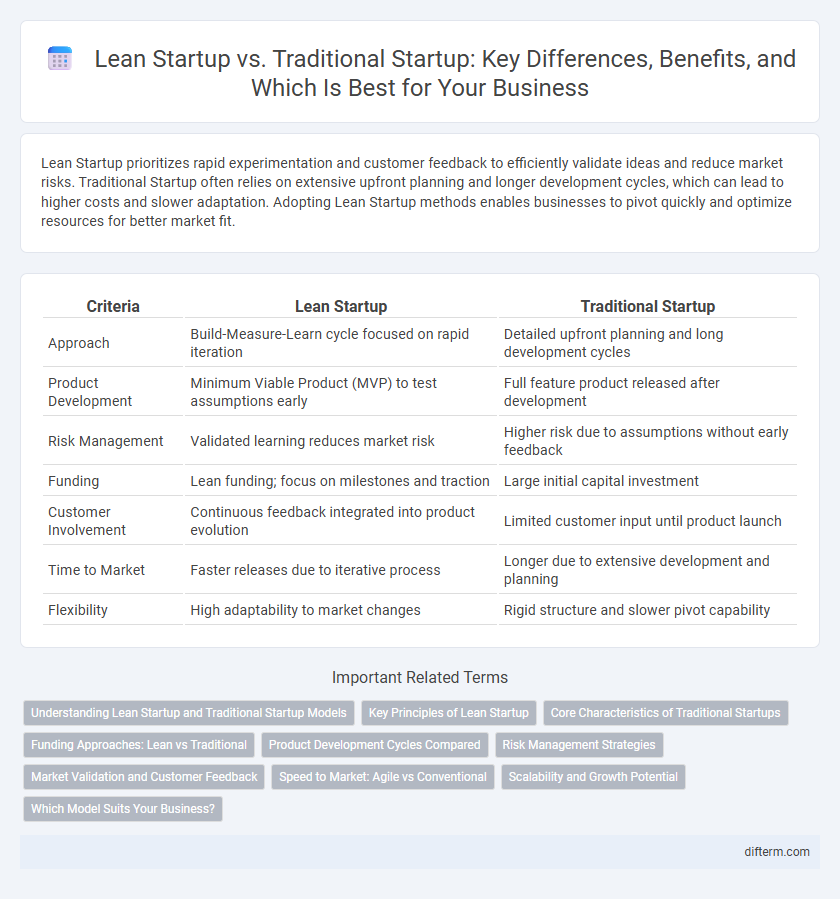Lean Startup prioritizes rapid experimentation and customer feedback to efficiently validate ideas and reduce market risks. Traditional Startup often relies on extensive upfront planning and longer development cycles, which can lead to higher costs and slower adaptation. Adopting Lean Startup methods enables businesses to pivot quickly and optimize resources for better market fit.
Table of Comparison
| Criteria | Lean Startup | Traditional Startup |
|---|---|---|
| Approach | Build-Measure-Learn cycle focused on rapid iteration | Detailed upfront planning and long development cycles |
| Product Development | Minimum Viable Product (MVP) to test assumptions early | Full feature product released after development |
| Risk Management | Validated learning reduces market risk | Higher risk due to assumptions without early feedback |
| Funding | Lean funding; focus on milestones and traction | Large initial capital investment |
| Customer Involvement | Continuous feedback integrated into product evolution | Limited customer input until product launch |
| Time to Market | Faster releases due to iterative process | Longer due to extensive development and planning |
| Flexibility | High adaptability to market changes | Rigid structure and slower pivot capability |
Understanding Lean Startup and Traditional Startup Models
Lean Startup emphasizes rapid experimentation, validated learning, and iterative product releases to minimize waste and adapt quickly to market feedback, fostering innovation and efficient resource use. Traditional Startup follows a linear process with extensive upfront planning, fixed business models, and longer product development cycles, often relying on assumptions rather than customer validation. Understanding these models helps entrepreneurs choose strategies that align with their risk tolerance, market dynamics, and growth objectives.
Key Principles of Lean Startup
Lean Startup emphasizes rapid experimentation, validated learning, and building minimum viable products (MVPs) to quickly adapt to market feedback. It relies on continuous innovation cycles that reduce waste by avoiding large upfront investments typical in Traditional Startup approaches. This methodology prioritizes customer development and iterative product releases, contrasting with Traditional Startup's focus on detailed business planning and long development phases before market entry.
Core Characteristics of Traditional Startups
Traditional startups emphasize detailed upfront planning, extensive market research, and long product development cycles before launch. These ventures rely heavily on fixed business models and significant initial capital investment to reduce risks. Success metrics focus on achieving steady growth and profitability after product introduction rather than iterative market feedback.
Funding Approaches: Lean vs Traditional
Lean startups prioritize iterative development and quickly test minimal viable products to attract early-stage funding from angel investors and venture capitalists seeking rapid scalability. Traditional startups often rely on comprehensive business plans and initial equity financing rounds, aiming for substantial upfront capital investment before market validation. Lean funding approaches emphasize adaptive allocation of resources, reducing financial risks compared to the fixed funding structure typical in traditional models.
Product Development Cycles Compared
Lean Startup emphasizes rapid product development cycles through iterative testing and customer feedback, allowing startups to pivot quickly based on validated learning. Traditional startups often rely on longer, linear development phases with extensive upfront planning and market research before product launch. This contrast results in Lean Startups reducing time-to-market and minimizing wasted resources compared to the more rigid and prolonged cycles typical of Traditional Startups.
Risk Management Strategies
Lean Startup minimizes risk through iterative product development, validated learning, and rapid customer feedback to avoid extensive upfront investment. Traditional Startup relies on comprehensive planning and market analysis, which can increase exposure to market uncertainties and financial risks. Emphasizing continuous experimentation, Lean Startup adapts quickly to changes, reducing failure costs and improving risk management efficiency.
Market Validation and Customer Feedback
Lean Startup emphasizes rapid market validation through iterative product testing and real-time customer feedback, enabling startups to pivot quickly and reduce market risks. Traditional startups often rely on extensive upfront planning and assume customer validation comes post-launch, potentially leading to misaligned products. Prioritizing continuous customer engagement and data-driven adjustments, Lean Startup methods enhance product-market fit and accelerate sustainable growth.
Speed to Market: Agile vs Conventional
Lean Startup methodology accelerates speed to market through iterative development and validated learning, enabling rapid product adjustments based on real customer feedback. Traditional startups often follow a linear, stage-gate process that extends timeframes due to extensive planning and upfront market research. Agile practices in Lean Startups reduce cycle times and mitigate risks by delivering minimum viable products quickly, whereas conventional methods may delay market entry, impacting competitive advantage.
Scalability and Growth Potential
Lean startups prioritize iterative product development and validated learning to optimize scalability by minimizing waste and quickly adapting to market feedback. Traditional startups often rely on extensive upfront planning and significant initial investment, which may delay growth and limit flexibility in scaling operations. The Lean Startup methodology enhances growth potential through rapid experimentation and customer-centric adjustments, enabling faster market penetration and resource-efficient expansion.
Which Model Suits Your Business?
Choosing between Lean Startup and Traditional Startup models depends on your business goals and market dynamics. Lean Startup emphasizes rapid experimentation, customer feedback, and iterative product development, ideal for highly uncertain markets and innovation-driven ventures. Traditional Startup suits businesses with clear product definitions, established markets, and structured planning, often requiring extensive upfront investment and detailed business plans.
Lean Startup vs Traditional Startup Infographic

 difterm.com
difterm.com